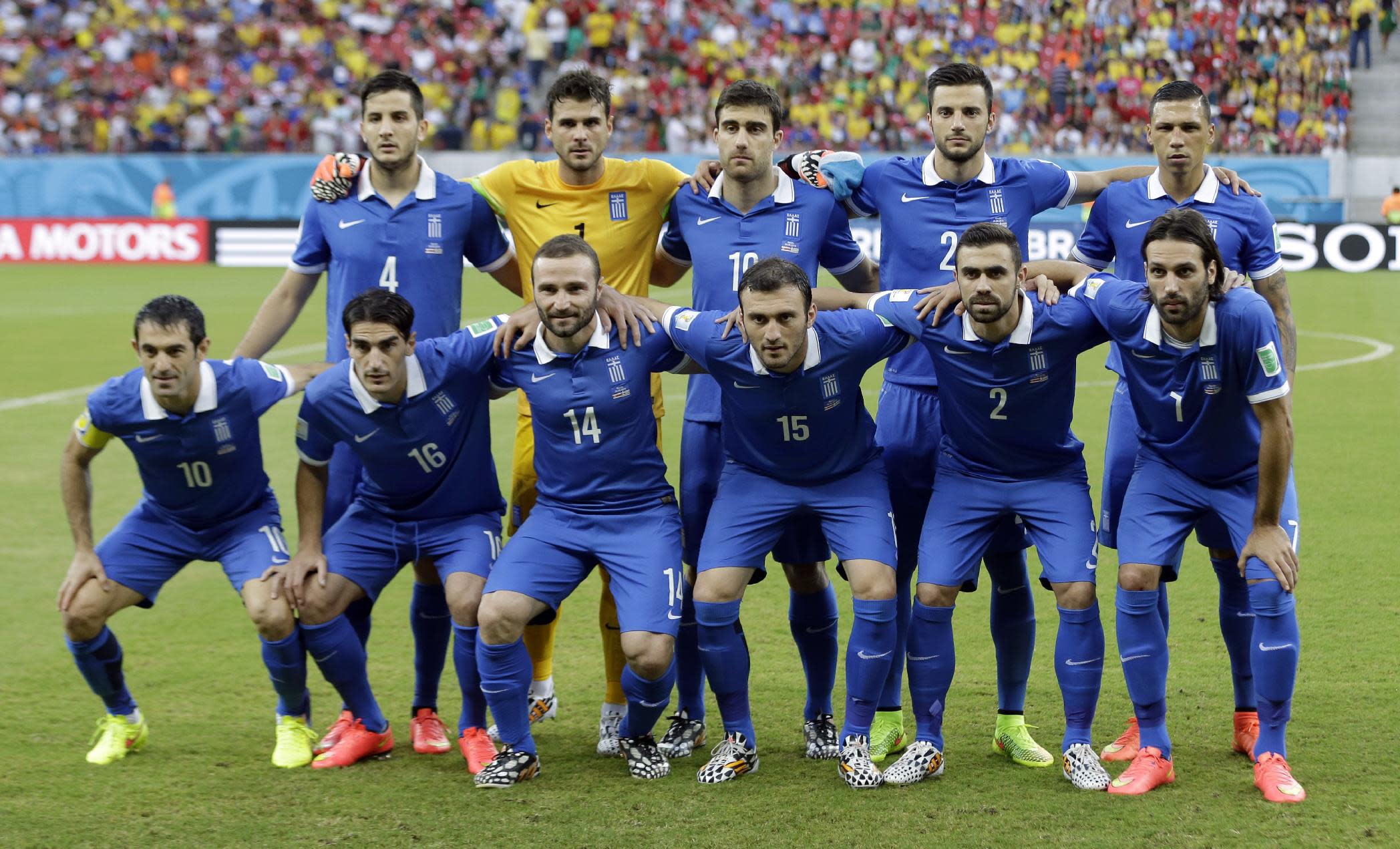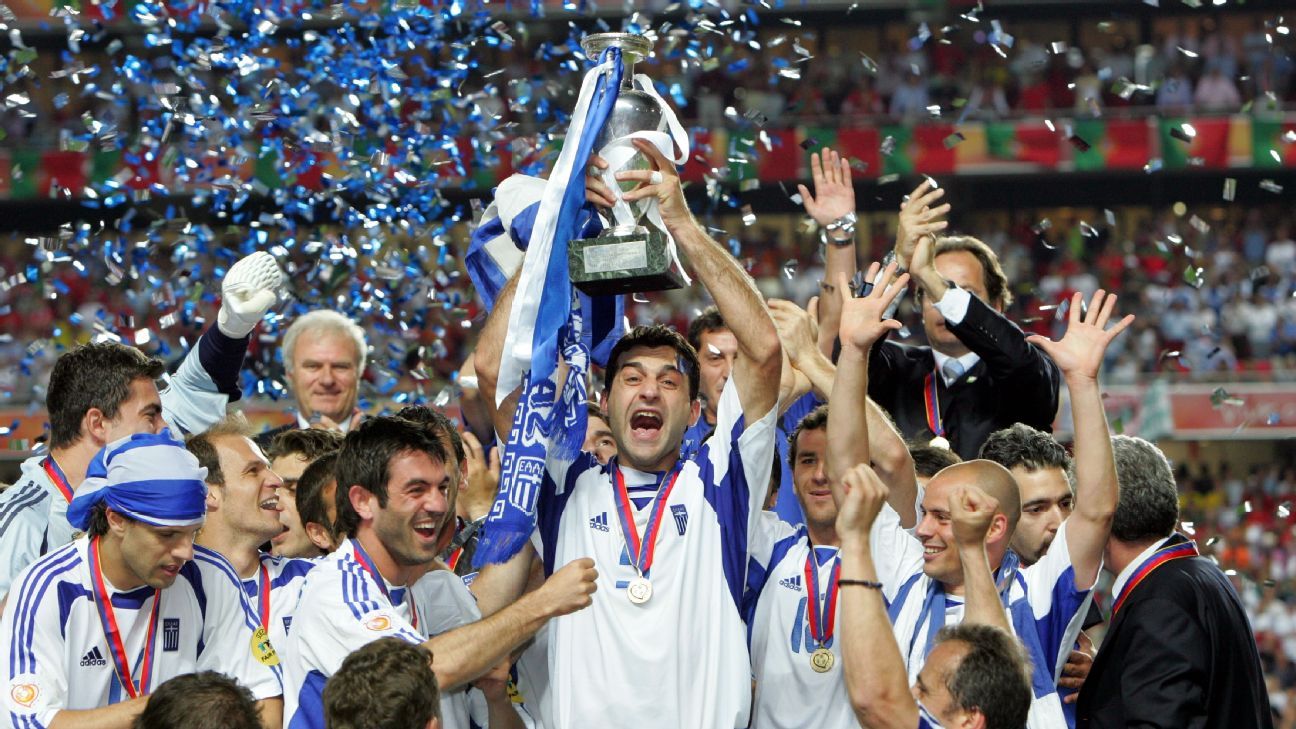
Greek Team Pose Prior Fifa World Editorial Stock Photo Stock Image Shutterstock
A Greek Tragedy Play. Plays were performed in an open-air theatre (theatron) with wonderful acoustics and seemingly open to all of the male populace (the presence of women is contested).From the mid-5th century BCE entrance was free. The plot of a tragedy was almost always inspired by episodes from Greek mythology, which we must remember were often a part of Greek religion.

Greek soccer players refuse World Cup bonuses
The Olympic Games began in the 8th century BC (probably 776 BC) at a place called Olympia, south west Greece. It was a huge festival in the lives of the Greeks because it served two main purposes. The first purpose of the Olympics back then was to honor the Greek god, Zeus. Zeus was highly revered and regarded as the king of all Greek gods. As.

Could the Greek national team be experiencing a Renaissance? Neos Kosmos
Such has been the impact of both Greek and Italian footballers at the highest level, an official Italian Team of the Century and a Greek Team of the Century have been named. At grassroots level, the Italians and Greeks continue to play footy throughout Australia.

Greece soccer teamEuro 2012 wallpaper Preview
The Greek Team of the Century was selected by the Athlos committee, headed by chairman Chris Pavlou, the former Carlton winger and current board member. They also consulted football legends Ron Barassi and David Parkin. There was a total of 55 players to choose rom, who played 3,521 games for 2,997 goals between them. Thirteen players.

Team of the Century NAFC
Western theatre - Ancient Greece, Drama, Tragedy: The first time theatre truly freed itself from religious ritual to become an art form was in Greece in the 6th century bce when the dithyramb was developed. This was a form of choral song chanted at festivals in honour of Dionysus, the god of wine, fruitfulness, and vegetation. Originally, it celebrated his rejuvenation of the earth; later, it.

Team of the century
A lot of Greek migrant kids too to AFL as it was a great way to assimilate with the non-Greek kids.. See who made up the AFL Greek Team of the Century. Facebook Twitter: @NeosKosmos Instagram.

Ancient Football
The Greek Team of the Century was a representative team chosen in 2004 in the sport of Australian rules football. Anthony Koutoufides and Peter Daicos were named vice-captains, Lou Richards was captain. The criterion for selection was that any Greek blood whatsoever constituted eligibility for the team. The farthest blood line was from Russell Morris, whose fourth great grandfather was Greek.

Greece European Champions 2004. Bring on the Euro 2012 euro2012 greece World football
According to tradition, the most important athletic competitions were inaugurated in 776 B.C. at Olympia in the Peloponnesos. By the sixth century B.C., other Panhellenic (pan=all, hellenikos=Greek) games involving Greek-speaking city-states were being held at Delphi, Nemea, and Isthmia.Many local games, such as the Panathenaic games at Athens, were modeled on these four periodoi, or circuit.

Greece Football Team World Cup Wallpaper Gallery
1 Playing statistics correct to the end of 1999. 3 Coaching statistics correct as of Round 6, 2024. Luke Beveridge (born 23 August 1970) is an Australian rules football coach and former player who played for Melbourne, Footscray and St Kilda in the Australian Football League (AFL) during the 1990s. He is senior coach of the Western Bulldogs.

GREEK WOMENS NATIONAL TEAM Road to Women's Euro 2021 ep. 1 YouTube
Greek Team of the Century: Vice-Captain. VFL/AFL Italian Team of the Century: Centre Half-Back. Sources: AFL Tables, AustralianFootball.com. Anthony Koutoufides ( / kuːtuˈfiːdiːz /; born 18 January 1973), also known by his nickname of Kouta, [2] [3] is a retired Australian rules footballer with the Carlton Football Club.

EPIC Wins of Greek Teams in Europe 1 YouTube
Archaic ideals. From 600 to 480 B.C.E., ancient Greek cemeteries and. sanctuaries. were filled with marble statues of beautiful young men and women. The images of nude young men are today called kouroi (singular: kouros), the ancient Greek word for boy, though we do not know if they were called kouroi in antiquity.

Print, AFL Team of the Century Australian Sports Museum
published on 27 April 2020. The ancient Greeks left the world such an impressive legacy of ideas that many of them were seen for centuries in the civilizations that followed and, even today, cultures around the world continue to display many of the quintessential features of life in ancient Greece. In this collection of resources, we examine.

Euro 2004 Greek Team wallpaper, Football Pictures and Photos Football pictures, Team wallpaper
ancient Olympic Games, quadrennial athletic event that was held in Olympia, Greece, from 776 bce to about 393 ce.It was part of a religious festival that honoured Zeus, and the name Olympics was derived from Mount Olympus, home of the Greek gods.The Games were a central part of Greek life, and major affairs, including wars, were often scheduled so as not to interfere with the event.

AFL Europe Trivia with Belushi’s 19 AFL Europe
Greek Team of the Century; Sources: AFL Tables, AustralianFootball.com: Peter Daicos (born 20 September 1961) is a former professional Australian rules footballer who played his entire 250-game career with the Collingwood Football Club in the VFL/AFL.

Team of the century
The ancient Olympic Games (Ancient Greek: τὰ Ὀλύμπια, ta Olympia) were a series of athletic competitions among representatives of city-states and were one of the Panhellenic Games of Ancient Greece.They were held at the Panhellenic religious sanctuary of Olympia, in honor of Zeus, and the Greeks gave them a mythological origin.The originating Olympic Games are traditionally dated to.

How Greece stunned the world to win Euro 2004 ESPN
The Metropolitan Museum of Art, New York, Purchase, Rogers Fund, 1907 (07.286.80) Athens, the venue for the first modern Olympics in 1896, also held athletic games in antiquity. Every four years at the end of the month Hekatombaion (early August), the Athenians gathered to celebrate the Greater Panathenaia—an extended and more elaborate.
- Laura Carmichael Movies And Tv Shows
- 22 24 Martin Road Centennial Park
- Divinity Original Sin Board Game
- Bayer 04 Leverkusen Vs Eintracht Frankfurt Lineups
- Forrest Griffin And Stephan Bonnar
- Outline Of A Four Leaf Clover
- Take Your Shoes Off Sign
- Are The Shops Open On Australia Day In Qld
- Who Is Illicit Affairs About
- Pullman Melbourne Albert Park Albert Park Vic